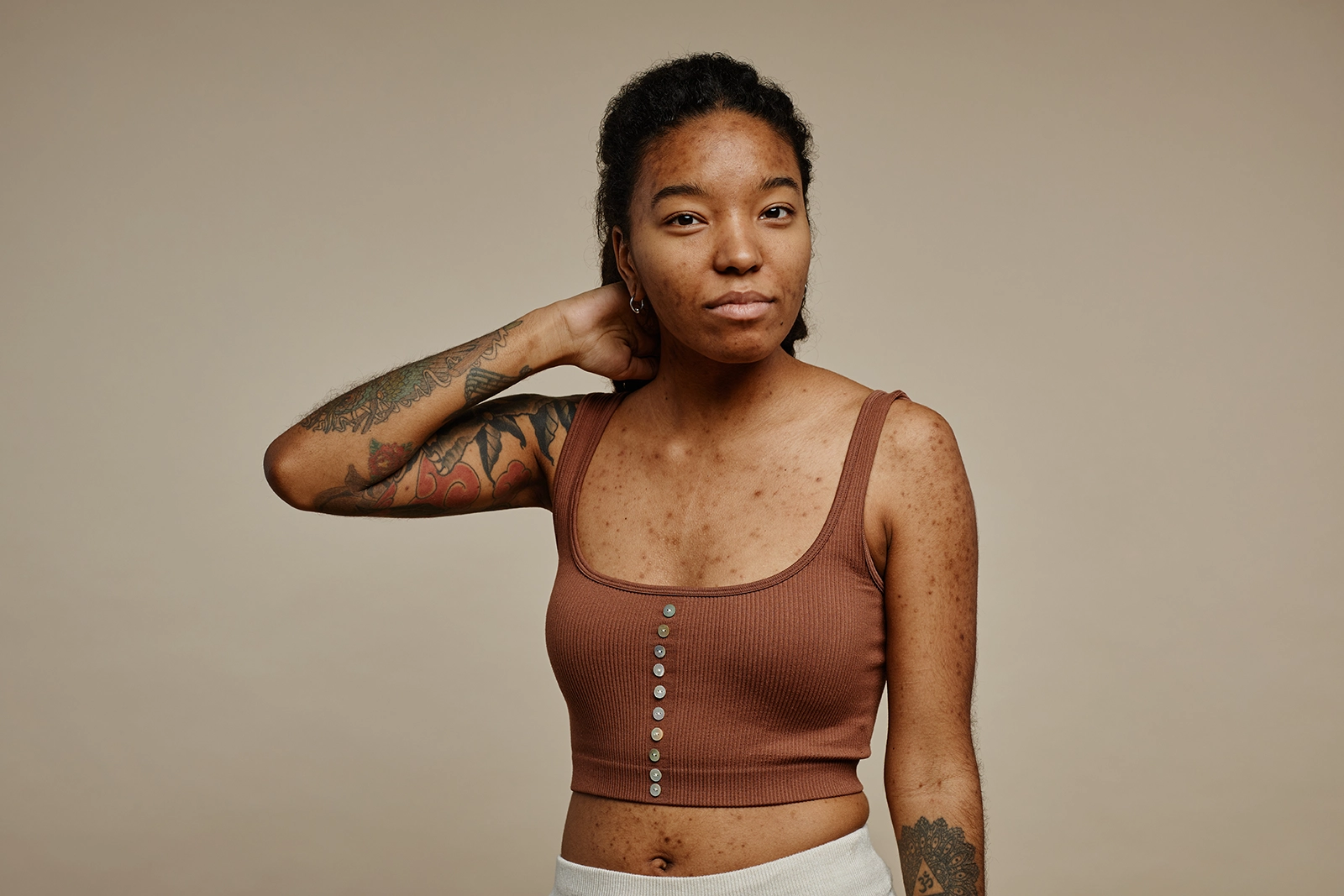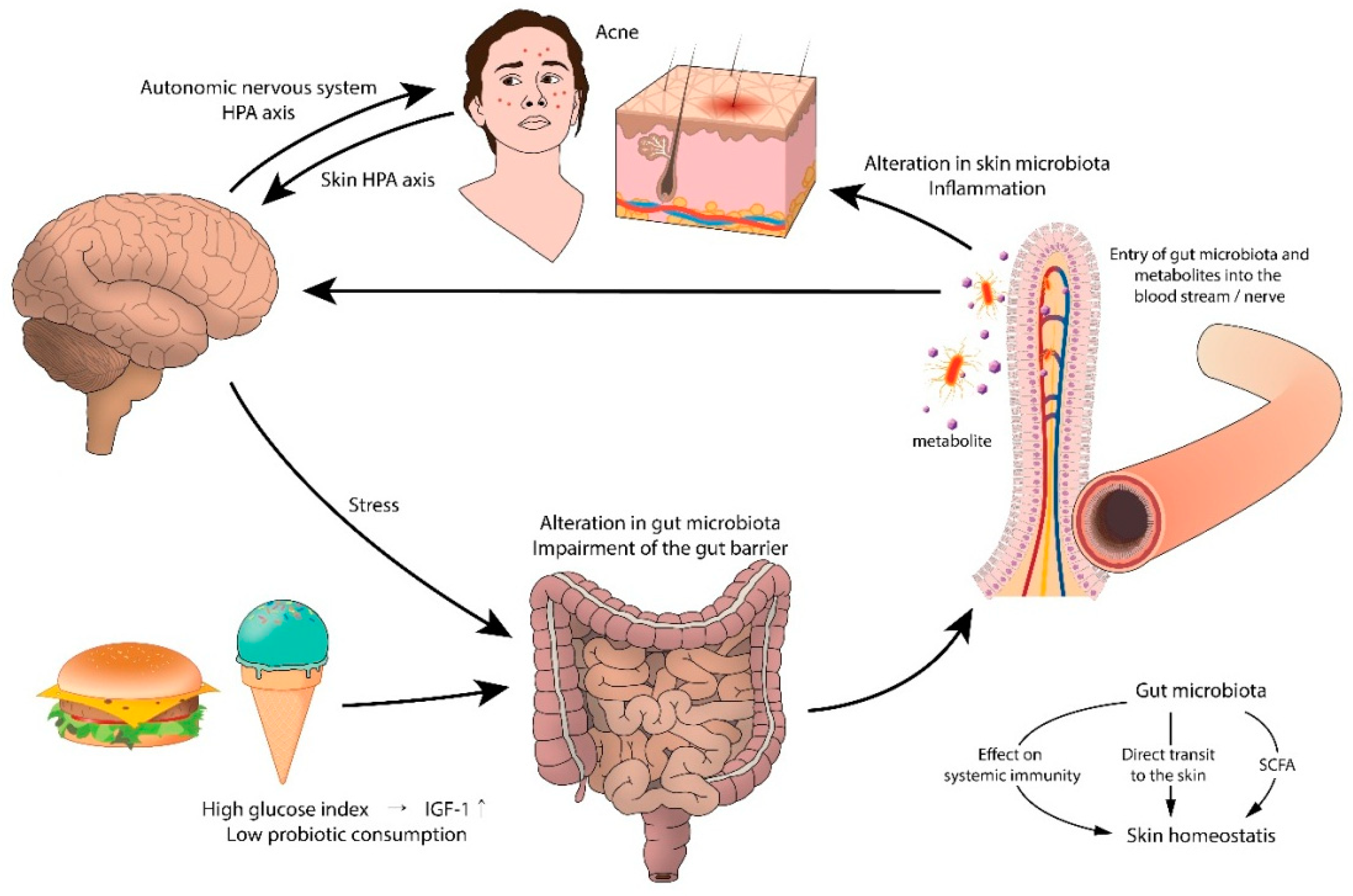Have you ever wondered why no matter how many creams or treatments you try, your acne just won’t go away? The answer might be closer than you think—right inside your gut.
Yes, your gut health and acne are connected in surprising ways that affect how your skin looks and feels. When your gut is out of balance, it can trigger inflammation and hormonal changes that show up as stubborn breakouts on your face.
But here’s the good news: by making some simple changes to what you eat and how you live, you can start healing your gut and see clearer, healthier skin. You’ll discover the powerful link between gut health and acne, plus easy steps you can take to fix gut-related acne for good. Ready to unlock your skin’s true potential? Keep reading!
Gut Microbiome And Skin Health
The gut microbiome is a community of trillions of bacteria living in the digestive tract. These bacteria affect many body functions, including skin health.
A healthy gut microbiome helps reduce inflammation and supports the immune system. This can lower the chances of skin problems like acne.
When the gut bacteria are out of balance, harmful bacteria can grow. This imbalance may trigger skin inflammation and worsen acne.
The Role Of Gut Bacteria In Skin Appearance
Good gut bacteria produce nutrients and compounds that support skin health. They help maintain the skin’s barrier and keep it hydrated.
Bad bacteria can release toxins that enter the bloodstream. These toxins may cause skin redness, swelling, and acne flare-ups.
How Gut Inflammation Affects Acne
Inflammation in the gut can spread to other parts of the body, including the skin. This can cause clogged pores and pimples.
Reducing gut inflammation often leads to clearer skin. Eating anti-inflammatory foods supports both gut and skin health.
Balancing The Microbiome For Better Skin
Eating foods rich in fiber, prebiotics, and probiotics helps nourish good gut bacteria. This balance can calm skin and reduce acne.
Fermented foods like yogurt and kefir add beneficial bacteria. These foods improve digestion and skin condition.

Credit: connect.gdx.net
Dietary Factors Influencing Acne
Diet plays a vital role in managing acne linked to gut health. Certain foods can either worsen or improve skin condition by affecting the gut microbiome and inflammation levels. Adjusting diet helps balance gut bacteria and reduce skin flare-ups.
Fiber And Prebiotics
Fiber feeds good bacteria in the gut, improving digestion and skin health. Prebiotics, found in foods like garlic, onions, and bananas, help grow beneficial bacteria. A high-fiber diet supports a healthy gut and may reduce acne.
Probiotic Foods
Probiotics introduce live bacteria that improve gut balance. Fermented foods such as yogurt, kefir, and sauerkraut contain probiotics. Regular intake of these foods can lower inflammation and support clearer skin.
Inflammatory Food Reduction
Refined sugars and processed foods increase inflammation and hormone imbalance. These foods can trigger acne flare-ups by disturbing gut health. Cutting down on sugary snacks and fast foods helps control acne.
Dairy And Acne
Some people find cow’s milk worsens their acne. Milk may affect hormones that increase oil production in the skin. Testing dairy intake and observing skin changes can help identify if dairy impacts acne severity.
Anti-inflammatory Fats
Healthy fats like omega-3s reduce gut and skin inflammation. Sources include fish, flaxseeds, and walnuts. These fats support the gut lining and may improve acne symptoms over time.
Lifestyle Changes For Clearer Skin
Clear skin often reflects a healthy lifestyle. Small daily habits can improve gut health and reduce acne. Making changes in stress, sleep, exercise, and skincare supports skin healing. These lifestyle changes work together to calm inflammation and balance the gut.
Adopting simple routines helps the body repair itself. The gut and skin are connected through the immune system and hormones. When the gut is healthy, skin problems like acne can lessen. Below are key lifestyle tips for clearer skin.
Stress Management
Stress raises inflammation in the body. This inflammation can trigger acne flare-ups. Managing stress lowers hormone levels that cause breakouts. Try deep breathing, meditation, or gentle yoga. Even short breaks during the day reduce tension. A calm mind supports a calm gut and skin.
Sleep Importance
Sleep helps the body heal and detoxify. Poor sleep weakens the immune system and worsens acne. Aim for seven to eight hours of rest each night. A regular sleep schedule improves gut function. Good sleep lowers inflammation and supports clearer skin.
Regular Exercise
Exercise boosts circulation and removes toxins through sweat. Physical activity helps balance hormones tied to acne. Aim for at least 30 minutes of movement daily. Walking, cycling, or swimming all work well. Exercise also reduces stress, benefiting both gut and skin health.
Consistent Skincare
A steady skincare routine supports gut-related acne treatments. Use gentle cleansers that do not dry out skin. Avoid harsh scrubs that can irritate and worsen acne. Moisturize daily to keep skin barrier strong. Consistency helps skin respond better to lifestyle changes.

Credit: www.mdpi.com
Supplements To Support Gut And Skin
Supplements can play a key role in supporting both gut health and skin clarity. They help restore balance in the digestive system, which often reflects on the skin. Targeted supplements reduce inflammation and promote healing from within. This approach supports the reduction of acne linked to gut issues.
Probiotics
Probiotics introduce good bacteria into the gut. These beneficial microbes help balance the gut flora and improve digestion. A healthy gut flora reduces toxins and inflammation, which can clear acne. Probiotics are found in yogurt, kefir, and supplements. Regular use may improve both gut and skin health.
Omega-3 Fatty Acids
Omega-3 fatty acids fight inflammation throughout the body. They help calm irritated skin and reduce acne flare-ups. These fats support gut lining integrity and improve digestion. Sources include fish oil, flaxseeds, and walnuts. Adding omega-3s can soothe skin and promote gut wellness.
Lactoferrin
Lactoferrin is a natural protein with anti-inflammatory properties. It helps reduce acne lesions by fighting harmful bacteria. Lactoferrin also supports immune function and gut barrier strength. Found in dairy and supplements, it aids in skin healing and gut balance.
L-glutamine
L-glutamine is an amino acid vital for gut lining repair. It helps seal the gut, preventing toxins from entering the bloodstream. This reduces skin inflammation and acne caused by gut issues. L-glutamine appears in bone broth, meat, eggs, and supplements. It promotes overall digestive and skin health.
Tips For Long-term Gut And Acne Care
Maintaining clear skin and a healthy gut requires ongoing care and attention. Long-term gut and acne care focuses on steady habits that support your digestive system and skin health. These tips help you build a routine that lasts and improves your well-being over time.
Patience And Consistency
Improving gut health and reducing acne takes time. Changes in diet and lifestyle do not show results overnight. Consistent eating habits that include fiber, probiotics, and reduced sugar help balance gut bacteria.
Stick to your routine daily. Avoid quick fixes or harsh treatments that may harm your skin or gut. Small, steady steps lead to lasting benefits. Remember, your gut and skin need time to heal and adjust.
Professional Guidance
Consult healthcare experts for personalized advice. A doctor or dermatologist can identify gut issues linked to acne. Tests can reveal imbalances or allergies affecting your skin.
A nutritionist helps create meal plans that support gut health and reduce inflammation. Professionals guide you through supplements, dietary changes, and skincare suited to your needs. Their support ensures safer and more effective care.

Credit: www.totallyderma.com
Frequently Asked Questions
How To Fix Gut-related Acne?
Fix gut-related acne by eating high-fiber, anti-inflammatory foods and probiotics. Avoid sugar, processed foods, and dairy. Manage stress, sleep well, and exercise regularly. Support gut lining with bone broth and consider supplements like probiotics, omega-3s, and lactoferrin. Stay consistent and seek professional advice if needed.
How Do You Detox Your Gut For Clear Skin?
Detox your gut for clear skin by eating high-fiber, prebiotic, and probiotic foods. Avoid sugar, processed foods, and dairy. Manage stress, sleep well, and exercise regularly. Consider supplements like probiotics and omega-3s. Stay consistent and seek professional advice if needed.
Can Probiotics Help Clear Acne?
Probiotics can help clear acne by balancing gut bacteria and reducing inflammation. Combine them with a healthy diet for best results.
What Are The Signs Of Poor Gut Health On Skin?
Poor gut health shows on skin as acne, redness, dryness, inflammation, dullness, and increased sensitivity.
What Is The Link Between Gut Health And Acne?
Gut health affects inflammation and hormone balance, both key factors in acne development.
How Does Poor Gut Bacteria Cause Acne?
Bad gut bacteria can increase inflammation and toxins, leading to skin breakouts.
Conclusion
Gut health plays a key role in managing acne. Eating fiber-rich, anti-inflammatory foods helps balance gut bacteria. Reducing sugar and processed foods lowers inflammation that can trigger breakouts. Adding probiotics and fermented foods supports digestion and skin health. Managing stress and getting enough sleep also improve gut and skin conditions.
Regular exercise aids toxin removal and reduces inflammation. Supplements like omega-3s and lactoferrin may help when combined with diet changes. Remember, healing takes time and consistency. Seek professional advice if acne persists or worsens. Healthy gut, clearer skin—simple yet powerful.
 Skip to content
Skip to content